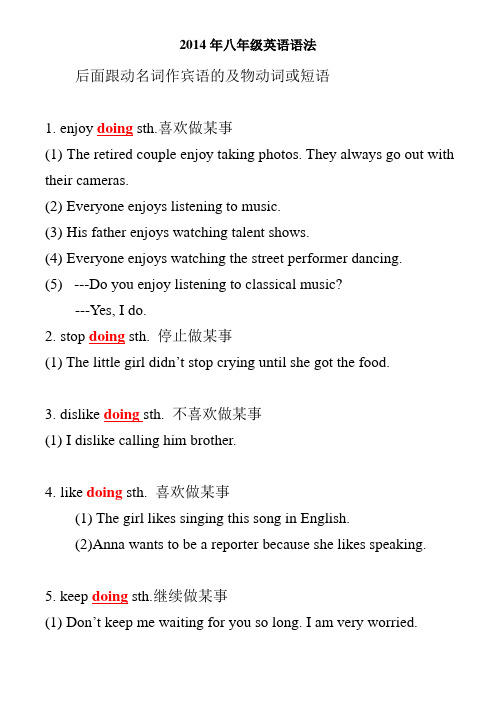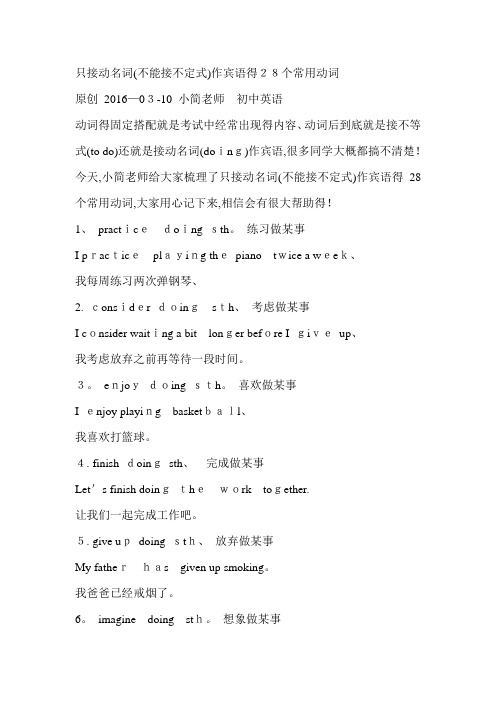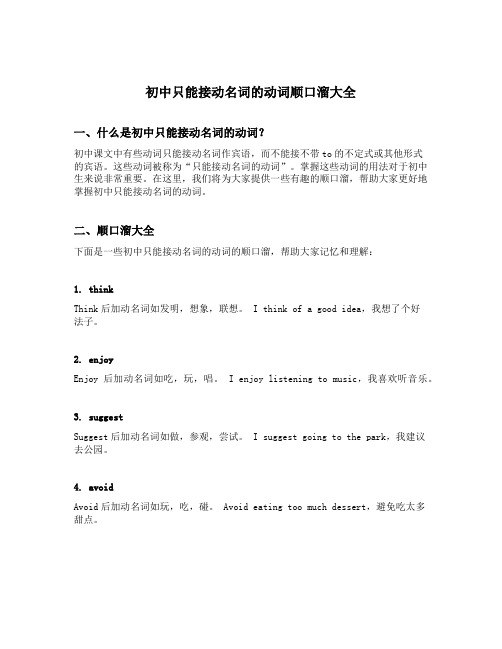接动名词做宾语的动词大串烧
后面接动名词作宾语的所有动词汇总

一、后面接动名词作宾语的所有动词汇总下面的动词要求动名词作宾语:动词+动名词(作宾语)acknowledge承认,自认cease 停止mention说到,讲到admit 承认tolerate忍受dislike不喜欢,讨厌advocate:提倡,主张complete完成dread可怕appreciate 感激,欣赏confess坦白endure忍受avoid避免contemplate细想enjoy享有,喜爱bear忍受defer拖延envy嫉妒can't help不禁delay延迟escape逃跑,逃避can't stand受不了deny否认excuse借口consider 考虑detest嫌恶fancy幻想,爱好favor 造成,偏爱mind 介意repent悔悟figure描绘,计算miss错过resent怨恨finish完成,结束不得pardon原谅,饶恕resist抵抗,阻止forgive原谅permit 允许resume恢复imagine设想postpone延迟,延期risk冒险involve卷入,包含practise 实行,实践suggest建议hate讨厌prevent阻止save营救,储蓄keep保持quit放弃停止stand坚持,忍受loathe非常讨厌,厌恶recall回想例如:I appreciate having been given the opportunity to study abroad two years ago.我很感激两年前给我出国学习的机会.(3)有些动词后使用动名词和动词不定式作宾语的差别(1)forget to do 忘记要去做某事(此事未做)forget doing忘记做过某事(此事已做过或已发生)2)stop to do 停止中断(某件事),目的是去做另一件事stop doing 停止正在或经常做的事3)remember to do 记住去做某事(未做)remember doing记得做过某事(已做)4) regret to do对要做的事遗憾regret doing对做过的事遗憾、后悔5)try to do努力、企图做某事try doing试验、试一试某种办法6) mean to do打算,有意要…mean doing意味着7)go on to do 继而(去做另外一件事情)go on doing 继续(原先没有做完的事情)8)propose to do 打算(要做某事)proposing doing建议(做某事)9) like /love/hate/ prefer +to do 表示具体行为;+doing sth 表示抽象、倾向概念(注)如果这些动词前有should一词,其后宾语只跟不定式,不能跟动名词.例如:I should like to see him tomorrow.10) need, want, deserve +动名词表被动意义;+不定式被动态表示“要(修、清理等)”意思.Don't you remember seeing the man before?你不记得以前见过那个人吗?You must remember to leave tomorrow.你可要记着是明天动身.I don't regret telling her what I thought.我不后悔给她讲过我的想法.(已讲过)I regret to have to do this, but I have no choice.我很遗憾必须这样去做,我实在没办法.(未做但要做)You must try to be more careful.你可要多加小心.Let's try doing the work some other way.让我们试一试用另外一种办法来做这工作.I didn't mean to hurt your feeling.我没想要伤害你的感情.This illness will mean (your) going to hospital.得了这种病(你)就要进医院.(一)动名词与不定式的区别动名词起名词作用,在句子中可以作主语、宾语、表语、定语、主语补足语、宾语补足语.不定式起名词、形容词、副词作用,在句子中除了动名词所起的作用外,还可以作状语.但两者之间也有差别:1.不定式的逻辑主语必须与主语一致,而动名词的逻辑主语范围较大,它可以指主语,也可以是泛指.如:I hate to work on weekends. 我讨厌周末干活.(指自己干活)I hate working on weekends. 我讨厌周末干活.(可以指自己,也可以泛指)2.动名词多指抽象的、概念性的动作,可以是多次的、经常的行为;不定式多表示具体的动作,尤其是某一次的动作.如:Reading in bed is a pleasure. 躺着看书是一种乐趣.I like swimming but I don't like to swim in the pool today. 我喜欢游泳,但是今天我不喜欢在游泳池里游泳.试比较:Playing with fire is dangerous. 玩火危险.(泛指玩火)To play with fire will be dangerous. 玩火会发生危险.(指一具体的动作)Talking for hours is more exhausting than you think. 一连讲几小时的话会比你想像的要累.(泛指讲话)To talk for hours is more exhausting than you think. 一连讲几小时的话可比你想像的要累.(指个人感受)3.在某些动词之后只能用动名词,而另一些动词之后只能用不定式.常后接动名词的动词有:admit, avoid, consider, defer (推迟,延期),delay,deny, dislike,enjoy,escape, fancy,finish,imagine,include,keep,mind,miss,postpone (推迟,延期),practise,recall,recollect,resent, resist, risk, stop, suggest等〇常后接动名词短语动词有have done, give up等.常后接不定式的动词有:afford, agree, aim, ask, claim,choose,decide, decline, demand, desire, determine, expect, fail, hope, manage, offer, plan,pretend, promise, refuse, resolve, threaten,wish等.4.有不少动词既可后接动名词也可接不定式.常见的有begin,continue, dread,fear,forget,go on, hate, help, intend, leam, like, love, mean, need, neglect, proceed, propose, regret, remember, start, stop, try, want等.这些动词后接的动名词与不定式在意义上往往没有什么区别.但有时两者的意义却有不同:(1) remember和forget后接不定式时,表示没有发生的动作,而接动名词时,表示已经发生过的动作.如:I remember doing that thing. 我记得做过那件事.I remember to do that thing. 我记着要去做那件事.I forgot to lock my door when I left the room. 当我离开房间时,我忘记锁门了.I forgot locking my door when I left the room. 我忘记了我离开房间时已把门锁上了.(2) stop接动名词,表示“停止正在做的事”;stop后接不定式表示“停下来去做某事”,该不定式不是宾语,而是目的状语.如:You'd better stop smoking. 你最好不要吸烟了.Stop to listen to the teacher. 停下来听老师讲.(3)try接不定式,表示“努力做某事”;try接动名词,表示“尝试做某事”.如:Try to do it again, you'll finish it. 努力再试一次,你就会完成的.They try reading the story in English. 他们试着用英语读那个故事. (4) regret后接不定式时,指将来或现在的动作;regret后接动名词时,指过去或现在的动作;regret后接动名词的完成式时,指过去的动作.如:I regret telling you the bad news. 我后悔把这个坏消息告诉你.I regret to say I'm unable to help you. 很抱歉我不能帮助你.(5)help后接动名词意谓“避免”,help后接不定式意为“帮助”.如:I can't help laughing. 我不禁笑起来.I can't help to clean up the place. 我不能帮忙打扫这地方.(6)mean后接动名词意为“意味着”,mean后接不定式意为“打算”.如:Doing morning exercises means getting up early. 做早操意味着要早起.I meant to help you. 我意在帮你.5.有些动名词的主动式可表达被动意义,而不定式则须用其被动式表达被动意义.如:我不堪被人想念.I won't bear thinking of.I won't bear to be thought about.它需要修理.It needs repairing.It needs to be repaired.6.有些动词在书面语中后多接动名词,在口语中后多接不定式.如:开始下雨了.It started raining.It started to rain.我害怕冒犯她.I fear offending her.I fear to offend her.7.在should (would) like, love等之后须用不定式.如:I'd like to thank you again. 我愿再次感谢你.I'd love to come sometime. 日后我愿意来的.。
人教版八年级英语下-后面跟动名词作宾语的及物动词或短语

后面跟动名词作宾语的及物动词或短语1. enjoy doing sth.喜欢做某事(1)The retired couple enjoy taking photos. They always go out with their cameras.(2)Everyone enjoys listening to music.(3)His father enjoys watching talent shows.(4)Everyone enjoys watching the street performer dancing.(5)---Do you enjoy listening to classical music?---Yes, I do.2.stop doing sth. 停止做某事(1) The little girl didn’t stop crying until she got the food.3. dislike doing sth. 不喜欢做某事(1) I dislike calling him brother.4.like doing sth. 喜欢做某事(1) The girl likes singing this song in English.(2)Anna wants to be a reporter because she likes speaking.5. keep doing sth.继续做某事(1) Don’t keep me waiting for you so long. I am very worried.6.have fun doing sth.享受做某事的乐趣(1)Last Sunday we went to the beach. We had great funplaying in the water.(2)He had fun playing in the waterpark yesterday.(3)---Do you have fun learning English?---No, I think it’s difficult.7.be good at doing sth./do well in doing sth.擅长做某事(1)My brother is good at playing basketball.(2)Both of them are good at dancing.(3)My best fiend is good at writing stories.(4)Liu Ying is good at singing. She sings as well as thefamous singer, CoCo.(5)He swims in the river every day. He is good at swimming.8. spend time doing sth.花费时间做某事(1)Linda spent 20 dollars buying a dictionary.(2)I spend two hours in finishing the work.(3)They spent two years building this fridge.(4)I usually spend an hour playing basketball with my good friends on Saturday.(5)I need to spend some time in travelling.(6)---Do you take exercise every day?---Yes, I always spend thirty minutes walking after supper.9. thanks for doing sth.因做某事而感谢(1) Thanks for helping me.(2) Thanks for telling me.(3) Thank you for inviting me to your party.(4) Thank you for inviting me to your house.(5) Thank you for bring some food for me.(6) Thank you for planning for the party.(7)Thank you for helping me feed my pet cat.(8)I didn’t know the news until you told me. Thank you for telling me that.10. practice doing练习做某事(1)I’m going to practice playing the guitar every day.11. keep on doing sth.不断地做某事(1) Although it rained, he kept on working on the farm all the time.12. finish doing sth.做完某事(1)With your help, we finished building that new school on time.(2)He finished reading the book before supper yesterday.(3)Richard turned off the computer after he had finished writing the email.13. play a part in doing sth. 参与做某事(1)Computer is playing an important part in our life now.(2)His sister always plays a part in saving the animals.(3)---A child’s family background brings him or her a bright future.---Not really. A study shows that reading for pleasure plays amore important part.14. look forward to doing sth.期盼做某事(1) I’m looking forward to watching an exciting football match.(2) Students are looking forward to having a free holiday.(3) They are looking forward to climbing the mountains.(4) Alice is looking forward to going to the moon one day.(5) I look forward to hearing from you all.(6)---I’m looking forward to seeing my parents soon. What about you?---Me, too.15. by doing sth. 通过做某事(1)My father made money by selling grass.(2)These days, most Americans celebrate the idea of giving thanks by having a big meal at home.(3)We often buy things by using the Internet.16. without doing sth.(1)He took my books without telling me.(2)He ran into the rain without taking an umbrella.17. How/What about doing…?做……怎么样(1)What about playing tennis?(2)How about seeing the film 2012?(3)How about making fruit salad?(4)How about going to the movie this Sunday?(5)---We have no classes this afternoon. How about going to the park?---Good idea.(6)---I feel stressed from time to time. Could you give me someadvice?---How about sharing your worries with your parents.18. can’t stand doing sth. 不能忍受做某事(1)Most of us can’t stand listening to the boring music.(2)I can’t stand watching the soap opera.19. be busy doing sth. 忙于做某事(1) ---Would you like to go camping with me?---I’d like to. But I’m busy doing my homework.20. feel like doing sth.想要做某事(1)He’s ill and doesn’t feel like eating anything.(2)I feel like playing soccer.(3)They feel like climbing that mountain, because it is too high.21. mind doing sth. 介意做某事(1)Would you mind getting up early and doing sports?(2)Would you mind looking after/taking care of/caring for my garden when I am on business?(3)Would you mind going shopping with me?(4)Would you mind opening the window? It’s too hot now.(5)I can’t hear the radio. Would you mind turning down the TV?(6)---Would you mind turning down the music a little? Don’t you think it’s too loud?---Sorry! I’ll do it in a minute.(8)---Do you mind opening the window?---Not at all.(9)---Would you mind smoking in the dining hall?---Of course not.(10)---Would you mind turning down the music?--- No, not at all.22. is about doing sth.(1)I’m not sure about being a doctor in the future.(2)The third resolution is about improving my relationshipwith my family and friends.23. try doing sth.尝试做某事24. forget doing sth.忘记做过某事25. start doing sth.开始做某事26. play a role in doing sth.发挥做某事是作用/在做某事方面扮演重要的角色27. see sb.doing sth.看见某人做某事。
接动名词作宾语的动词

习惯上接动名词作宾语的动词【附记忆口诀】其后习惯上要跟动名词作宾语的常见动词有以下51个:acknowledge, admit, appreciate, avoid, burst out, consider, contemplate注视,凝视,盘算,计议,周密考虑, delay延期,推迟,耽搁, defer使推迟,使延期,拖延,推迟,[军]使延期入伍, deny.拒绝,拒绝承认, detest憎恶,嫌恶,痛恨, dislike, dispute辩论,争论, endure忍受,忍耐, enjoy, evade逃避,规避,逃脱, escape逃脱,(气体,液体等)漏出,(未受伤或只受了一点伤害而)逃脱,声音(不自觉地)由……发出, excuse, face, fancy想像,设想,想要,猜想, feel like 摸起来像是…,有…的感觉,想要…, finish, forgive, give up, grudge怀恨,妒忌,吝惜,不情愿做, (can’t) help, hinder阻碍,妨碍,成为阻碍, imagine, include, involve, keep (on), leave off, mention, mind, miss, necessitate .使…成为必要,需要,强迫,迫使, pardon, postpone .使延期,延缓, practise, prevent, put off, recall, recollect记起,想起, repent对(自己的所为)感到懊悔或忏悔, resent对……感到愤怒,怨恨,愤恨,厌恶, resist, risk, (can’t) stand, stop, suggest, understand 等。
如:用法举例:He admitted having taken the money. 他承认拿了那笔钱。
It was impossible to avoid being affected. 要想不受影响是不可能的。
动词后面只能接动名词和不定式做宾语的顺口溜

1、动词后面只能接动名词做宾语的顺口溜
建议完成多练习(suggest, advise , finish , practice )
避免错过少延期(avoid, miss, delay)
承认喜欢和原谅(admit, enjoy, like ,love, forgive , excuse,pardon)允许想象需欣赏(allow, imagine, appreciate.)
反对逃脱与冒险(mind, escape, risk)
考虑抵制要继续(consider, resist , keep)
厌倦拖延别放弃(be tired of , put off , give up)
期望坚持定成功(look forward to ,insist on, stick to ,succeed in) 2、动词后面只能不定式做宾语的顺口溜
选择目的想申请(choose, aim, want ,wish, hope ,desire, apply)拒绝要求盼决定
(refuse, demand, ask ,beg, expect, decide, determine)
假装许诺同意学(pretend, promise, agree, learn)
主动声称帮安排(offer, claim, help, arrange)
碰巧转身付得起(happen, turn ,afford)
计划威胁未做成(plan ,threaten, fail)
(四川省武胜县乐善中学符小林。
中考:只接动名词作宾语的28个常用动词

只接动名词(不能接不定式)作宾语得28个常用动词原创2016—03-10 小简老师初中英语动词得固定搭配就是考试中经常出现得内容、动词后到底就是接不等式(to do)还就是接动名词(doing)作宾语,很多同学大概都搞不清楚!今天,小简老师给大家梳理了只接动名词(不能接不定式)作宾语得28个常用动词,大家用心记下来,相信会有很大帮助得!1、practicedoing sth。
练习做某事I practiceplaying thepiano twice a week、我每周练习两次弹钢琴、2. consider doingsth、考虑做某事I consider waiting a bit longer before I giveup、我考虑放弃之前再等待一段时间。
3。
enjoydoing sth。
喜欢做某事I enjoy playing basketball、我喜欢打篮球。
4. finish doingsth、完成做某事Let's finish doingthework together.让我们一起完成工作吧。
5. give updoing sth、放弃做某事My fatherhas given up smoking。
我爸爸已经戒烟了。
6。
imagine doing sth。
想象做某事I can’timagine marryingsuch a woman.我不能想象娶了这样一个女人、7。
keep doingsth。
一直做某事I kept studyingEnglish for 1 hour yesterday evening. 昨天晚上,我一直学了1小时英语。
8、putoffdoingsth、推迟做某事Sometimes students put off doing theirhomeworkuntil the lastminute。
有时学生们会拖延到最后一分钟才做作业、9. risk doing sth、冒险做某事To win thegamble,herisked losing 100dollars。
初中只能接动名词的动词顺口溜大全

初中只能接动名词的动词顺口溜大全一、什么是初中只能接动名词的动词?初中课文中有些动词只能接动名词作宾语,而不能接不带to的不定式或其他形式的宾语。
这些动词被称为“只能接动名词的动词”。
掌握这些动词的用法对于初中生来说非常重要。
在这里,我们将为大家提供一些有趣的顺口溜,帮助大家更好地掌握初中只能接动名词的动词。
二、顺口溜大全下面是一些初中只能接动名词的动词的顺口溜,帮助大家记忆和理解:1. thinkThink后加动名词如发明,想象,联想。
I think of a good idea,我想了个好法子。
2. enjoyEnjoy后加动名词如吃,玩,唱。
I enjoy listening to music,我喜欢听音乐。
3. suggestSuggest后加动名词如做,参观,尝试。
I suggest going to the park,我建议去公园。
4. avoidAvoid后加动名词如玩,吃,碰。
Avoid eating too much dessert,避免吃太多甜点。
5. appreciateAppreciate后加动名词如您,你,他。
I appreciate your help,我感谢你的帮助。
6. admitAdmit后加动名词如犯错误,看电影,学英语。
He admitted making a mistake,他承认犯了一个错误。
7. denyDeny后加动名词如偷窃,谎言,问题。
He denied stealing the money,他否认偷了钱。
8. avoidAvoid后加动名词如玩,吃,碰。
Avoid eating too much dessert,避免吃太多甜点。
9. considerConsider后加动名词如去外地,转行,换工作。
I’m considering changing my job,我在考虑换工作。
10. finishFinish后加动名词如作业,洗碗,吃饭。
动词+动名词的搭配
动词+动名词的搭配简介动词+动名词的搭配是英语中常见的一种短语结构。
它由一个动词和一个紧跟在其后的动名词构成,形式上相当于一个动词短语。
这种搭配在句子中具有多种语法功能,包括作主语、宾语、表语、定语等。
作主语动词+动名词的搭配可以作为句子的主语,表示某种动作、行为或经历。
例如:- Swimming is good for health.(游泳对健康有益。
)- Singing is her favorite activity.(唱歌是她最喜欢的活动。
)作宾语动词+动名词的搭配可以作为句子的宾语,表示动作的对象或者完成某一动作。
例如:- I enjoy dancing.(我喜欢跳舞。
)- She hates cooking.(她讨厌做饭。
)作表语动词+动名词的搭配还可以作为句子的表语,表示主语的特点或者状态。
例如:- Her job is teaching.(她的工作是教书。
)- The best way to learn English is practicing.(研究英语的最好方法是练。
)作定语动词+动名词的搭配可以作为名词的定语,修饰名词。
例如:- A swimming pool(a pool for swimming)(游泳池)- A cooking class(a class for cooking)(烹饪课程)总结动词+动名词的搭配是英语中常见的短语结构,具有多种语法功能。
它可以作主语、宾语、表语、定语等,用于句子中,可以丰富句子的表达方式,增强语言的表达能力。
这种搭配的使用需要根据上下文和语境合理运用。
在写作中,可以积极利用动词+动名词的搭配,使句子更加生动、精确、地道。
参考资料:。
英语中常跟动名词做宾语的动词,逗号,宾语从句
英语中常跟动名词做宾语的动词Admit, stand(忍受,容忍),appreciate, avoid, complete, consider, enjoy, escape, excuse(原谅),fancy(imagine), finish, forgive, keep(continue), mind, miss(错过), pardon, practice, prevent, risk, suggest, advise, allow, permit, acknowledge, require, tolerate(容忍,忍受),favor(喜欢),involve, guarantee, approve(同意),encourage, ban(禁止),predict其中advise, allow, permit后提到相关人,用to do英语中常跟不定式做宾语的动词Agree, refuse, offer, promise, choose, decide, determine, attempt, intend, manage, fail, ask, hope, want, expect, long, wish, seek, plan, prepare, learn, mean, volunteer, pretend, dare, afford, beg, demand, dislike, fear英语逗号你注意到了吗?高考英语单选题中,20%左右的题含有逗号。
如果对逗号不加注意,有可能会对整个句子的理解发生偏差。
一般来说,英语句中的逗号主要出现在以下语法现象中:1.We must redouble our efforts,or we‘ll never be able to catch up with the others.(并列句)2.Young as he is,he is equal to the task.(主从复合句——让步状语从句)3.The room was full of students,ten of whom are from foreign countries.(主从复合句——非限制性定语从句)4.Given enough time,we are sure to do it well.(非谓语形式——过去分词)5.Not having seen her for a long time,missed her very much.(非谓语形式——现在分词)6.They must have gone there last night,didn‘t they?(反意疑问句)注意题目中的逗号能使我们根据选项,有的放矢地做题。
动词后接动词不定式/动名词作宾语用法小结
动词后接动词不定式/动名词作宾语用法小结动词是英语中最活跃的词性之一,其主要作用是在句中作谓语。
在谓语动词后接动词作宾语时,主要分为两种情况:Ⅰ动词加动词不定式能以不定式做宾语的动词很多,常见的有:want,hope,wonder,wish,agree,try,manager,offer,decide,fail,refuse,ask,pretend,intend,attempt,teach,discuss等。
例如:I have learned to drive the car.They refused to accept my suggestion.He promised to come.Ⅱ动词加动名词在enjoy, appreciate, admit, consider, mind, avoid., miss, can’t help, deny, practise, allow, finish, imagine, forbid, suggest等这些动词之后要求用动名词作宾语。
例如:Have you finished repairing your car?She suggested spending another week in the country.Do you feel like taking a walk.通常要后接动名词作宾语的动词英语中有些动词后接另一个动词作宾语时,通常要用不定式,不用动名词,这类动词主要admit(承认), advise(建议), allow(允许), appreciate(感激), avoid(避免), consider(考虑), delay(推迟), discuss(讨论), dislike(不喜欢), enjoy(喜爱), escape(逃脱), excuse(原谅), fancy(没想到), finish(完成), forbid(禁止), forgive(原谅), give up(放弃), imagine(想像), keep(保持), mention(提及), mind(介意), miss(没赶上), pardon(原谅), permit(允许), practise(练习), prevent(阻止), put off(推迟), report(报告), resist(忍住), risk(冒险), stop(停止), suggest(建议), understand(理解)等。
接动名词做宾语的34个常用动词
接动名词(不接不定式)作宾语的34个常用动词
prevent doing sth. 阻止做某事 prohibit doing sth. 禁止做某事 put off doing sth. 推迟做某事 report doing sth. 报告做某事 risk doing sth. 冒险做某事 stop doing sth. 停止做某事 suggest doing sth. 建议做某事 understand doing sth. 理解做某事
接动名词(不接不定式)作宾语的34个常用动词 fancy doing sth. 设想做某事 finish doing sth. 完成做某事 forbid doing sth. 禁止做某事 forgive doing sth. 原谅做某事 give up doing sth. 放弃做某事 imagine doing sth. 想象做某事 keep doing sth. 保持做某事 mention doing sth. 提及做某事 mind doing sth. 介意做某事 miss doing sth. 错过做某事 pardon doing sth. 原谅做某事 permit doing sth. 允许做某事 practice doing sth. 练习做某事
接动名词(不接不定式)作宾语的34个常用动词
admit doing sth.
承认做某事
advise doing sth. 建议做某事
allow doing sth.
允许做某事
appreciate doing sth. 感激做某事
avoid doing sth.
避免做某事
consider doing sth. 考虑做某事
delay doing sth. 推迟做某事
- 1、下载文档前请自行甄别文档内容的完整性,平台不提供额外的编辑、内容补充、找答案等附加服务。
- 2、"仅部分预览"的文档,不可在线预览部分如存在完整性等问题,可反馈申请退款(可完整预览的文档不适用该条件!)。
- 3、如文档侵犯您的权益,请联系客服反馈,我们会尽快为您处理(人工客服工作时间:9:00-18:30)。
Hale Waihona Puke 他们不仅不会原谅错过这样的事情,而且介意逃避练习 他们不仅不会原谅错过这样的事情, 说英语。 说英语。 They not only won’t excuse missing doing such things, but also mind escaping practicing speaking English. 在英语课上,我们情不自禁地用一些新的单词词组翻译 在英语课上, 句子,并避免犯错误。 句子,并避免犯错误。 In English class, we can’t help translating sentences by using several new words and phrases and avoid making mistakes. 现在我们开始着手注意认真听老师讲课了,盼望着将来 现在我们开始着手注意认真听老师讲课了, 被重点大学录取。 被重点大学录取。 Now we get down to paying attention to listening to the teachers carefully, looking forward to being admitted to key universities.
Our teachers advise/suggest delaying enjoying playing and encourage working hard. They allow admitting making mistakes. The school rules forbid considering risking doing anything, but permit imaging feeling like doing useful things. English teachers appreciate finishing practicing spoken English carefully. They not only won’t excuse missing doing such things, but also mind escaping practicing speaking English. In English class, we can’t help translating sentences by using several new words and phrases and avoid making mistakes. Now we get down to paying attention to listening to the teachers carefully, looking forward to being admitted to key universities.
